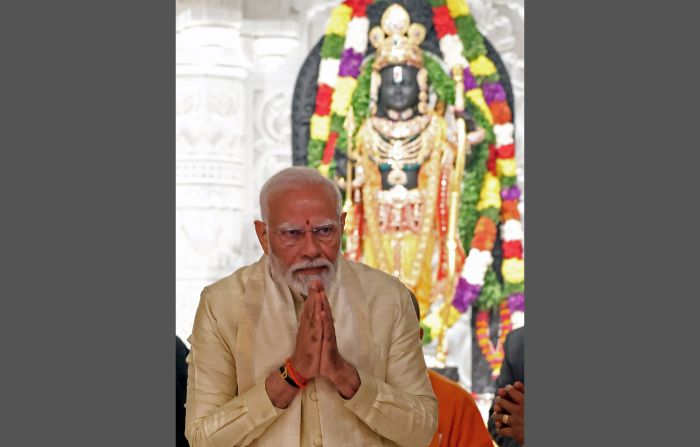- Sunday, April 20, 2025
The Supreme Court of India on November 9, 2019, granted the once-disputed site, on which the 16-century Babri Masjid stood before its demolition in December 1992, to Hindu petitioners.

By: Shubham Ghosh
INDIAN prime minister Narendra Modi on Monday (22) thanked the country’s judiciary for “justice” dispensed more than four years ago, shortly after completing the consecration of the Ram temple in the northern holy town of Ayodhya.
He was referring to the Supreme Court of India’s decision of November 2019 to grant the once-disputed site, on which the 16-century Babri Masjid stood before its demolition in December 1992, to Hindu petitioners.
Addressing a gathering after the ‘pran pratsitha’ (consecration) ceremony got over, the Indian PM said, “Even after the constitution came into existence, a legal battle was fought for decades (over) Lord Ram’s existence. I would like to thank the judiciary that delivered justice and (allowed) Lord Ram’s temple was built in a legal manner…”
आज जब भारतवर्ष परंपरा की पवित्रता और आधुनिकता की अनंतता के पथ पर चल रहा है, ऐसे में हमारी युवा शक्ति से मेरा एक आग्रह… pic.twitter.com/mCPgbY8NZN
— Narendra Modi (@narendramodi) January 22, 2024
“January 22, 2024, is not merely a date… it marks the advent of a new era,” he said.
Read: Ram Lalla ‘opened’ for the world as PM Modi leads consecration
Hailing Lord Ram’s “supreme blessings” on the occasion, Modi said he sought forgiveness from the lord for there were “shortcomings in our penance that we could not complete this work (the temple) for so long”.
“The delay has been overcome,” he said.
Read: How Indian diaspora is celebrating ahead of Ram temple consecration
On November 9, 2019, a bench of senior judges of the top court, including former chief justice (CJ) Ranjan Gogoi and current CJ DY Chandrachud, relied on a report by the Archaeological Survey of India that confirmed the existence of a structure beneath the mosque to give the ruling in favour of the Hindu side that argued that the place where the mosque once stood was the birthplace of Ram.
The court also said that the demolition of the mosque, which was followed by riots in which more than 2,000 people were killed, a “calculated act of destroying a place of public worship”, adding the Muslim community had been “wrongly deprived of a mosque constructed well over 450 years ago”.
The judgment also paved the way for the construction of a mosque at an alternative five-acre land located some 25 kilometres from Ayodhya but only its foundation has been laid so far.
All the five judges that gave the order in 2019 were invited to the consecration of the Ram temple but it is unclear if any of them attended.
The consecration ceremony has not been without controversies either. While the opposition Indian National Developmental Inclusive Alliance accused Modi and his Bharatiya Janata Party of politicising the religious event to secure votes in the upcoming general elections, all four shankaracharyas, Hindu spiritual giants, stayed away from the event saying the event was given a political touch and criticised the consecration of a temple that was yet to be completed.